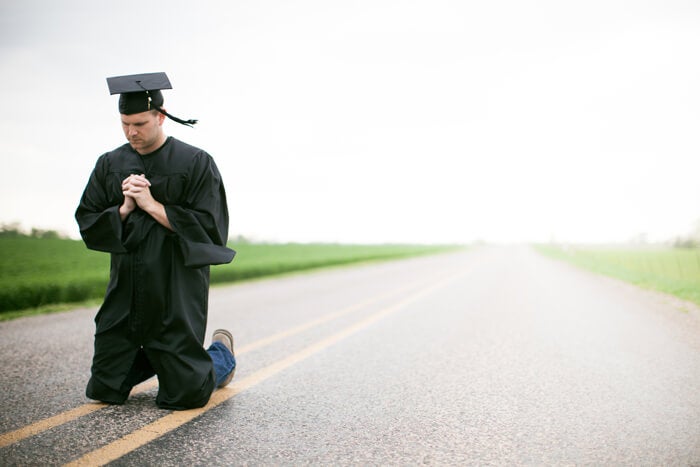
It’s that time of year again—senior photos are flooding social media, and graduating students are daydreaming about walking across the stage. After four years of hard work, the valedictorian and salutatorian are carefully writing their speeches for the graduation ceremony. One may reference their faith and another may discuss sports, music or other influences in their life. Either way, when students are allowed to write their own speeches, the students have the right to express their own unique journey.
Today, many students are coming under fire for mentioning their faith, whether it’s their favorite Bible quotes, prayers, or other references to God in their speeches at graduations.
For example, it happened in 2011 to Angela Hildenbrand, a First Liberty client and valedictorian who wanted to pray during her graduation speech—and was threatened with incarceration by a federal judge. First Liberty Institute got an emergency decision from the U.S. Court of Appeals for the Fifth Circuit protecting Angela’s freedom to share her faith and pray during her valedictorian address.
School administrations often claim that the speeches written by the students are reflections of the school board, giving them the right to censor a student’s graduation speech.
This is simply not true. As long as the valedictorian, salutatorian, president, or other students selected to write speeches are chosen by neutral criteria such as their academic achievements, the students have the right to reference what is important to them in their speeches, including their faith. Students maintain control over the content of their speeches, not the school board.
Students maintain control over the content of their speeches, not the school board.
According to the U.S Department of Education, “Where students or other private graduation speakers are selected on the basis of genuinely neutral, evenhanded criteria and retain primary control over the content of their expression, that expression is not attributed to the school and therefore may not be restricted because of its religious (or anti-religious) content.”
No school administrator or school board has the right to limit a student’s religious speech unless they prohibit other forms of speech. And if a school board feels it is necessary, they can make a neutral disclaimer that the speech reflects the personal opinions of the student giving the speech, and is not a reflection of the school board.
Students have the right to speak about their faith in God. School officials cannot limit their private speech. Students have the right to speak about religion in the same way they are able to speak about who won the most recent basketball game. The Supreme Court even ruled in Tinker v. Des Moines that neither students nor teachers “shed their constitutional rights to freedom of speech or expression at the schoolhouse gate.”
Students who have been honored with the privilege of presenting their own speeches at their graduation ceremonies should not fear incarceration, censorship, or any other threats to their freedom of speech regarding their faith. Graduation speeches should be a reflection of each student’s personal journey, and a testimony to their hard work and what has brought them to where they are. No student should live in fear for his or her faith, and no one should be reprimanded for sharing his or her story.
For more information regarding students’ right to speech in school, download our free Religious Liberty Protection Kit for Students and Teachers. This guide informs students and teachers what they have the right to say and do on school grounds.
News and Commentary is brought to you by First Liberty’s team of writers and legal experts.